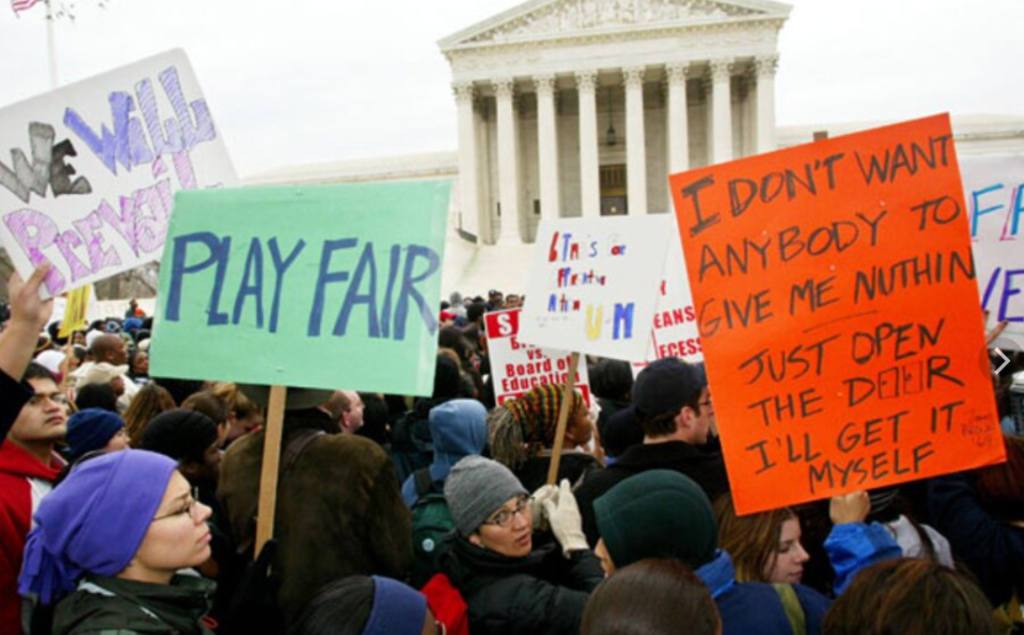Kenny Xu of Students for Fair Admissions takes on wokeness and affirmative action.
Steve Malzberg (SM)– I want to welcome back to the show a man that I’ve talked to here and other places before I came here in anticipation of today. And I want to congratulate Kenny Xu, the author of School of Woke, How Critical Race Theory infiltrated American Schools and why we must reclaim them. He president of Color Us United, which advocates for a color blind society. And he was very instrumental and an expert on this whole Harvard Case, which was decided by the Supreme Court today.
Kenny, you’ve been a very busy man throughout the day. I’ve seen you all over the place. Welcome aboard, sir.
Kenny Xu: Thank you for having me.

SM– It’s my pleasure alright. So, your reaction to “the reaction,” I mean, you know, the polls and everything about a poll shows it’s all about how you ask the question.
But the CBS poll other polls; CBS showed 70% of respondents said prior to the decision that race and ethnicity should not be used in admissions to colleges and universities.
So the Supreme Court here, which ruled, coincidentally, as the American public believes and still they’re being lambasted by a media which is calling them out of touch. Calling them racist, calling this, calling them that, what do you make of the reaction you’ve seen in her today?
Kenny Xu: It’s something that is an unbelievably great decision. There should be no reaction except for praise. I don’t understand why people, caring people, are getting in a tiff about the Supreme Court banning racial discrimination.
Under the new Supreme Court precedent, colleges cannot consider race and admissions. That means that colleges can’t be racist.
That means that colleges have to admit people based on merit-based criteria that are widely agreed upon, like grades, test scores, performance on a personal essay, etcetera.
None of this involves prejudice. None of this involves white supremacy. All this does is ensure fairness in admissions, and I think that that is the precedent the Supreme Court sets.
SM: Yeah. I couldn’t agree more. I do want to play and I want to get into the case a little more, but I do want to change the topic. You were on CNN with Abby Phillips. And I want to ask how you felt as you know, to me and others, so I’m not the first one to say this.
It felt like she cut you off because you really had her as an African American, you know, law analyst and host, who most likely, you know, went to college and law school.
I don’t know if she got in through affirmative action or not. But here is a cut 3:05. Listen to this.
Kenny Xu: We want black students to succeed. We want every student to succeed, low income students to succeed, but you have to put them in scenarios in places where they’re likely to excel. And lowering your standard to admit somebody of a socioeconomic status or race would not help them do that. In fact, it would harm their graduation rate in excellent schools.
CNN Abby Phillips: Well, as the case also points out, the standard isn’t necessarily lowered because the students are all admitted. It’s the question of whether race can be an added consideration, a tipping point, based on the use cases.
Kenny Xu: The standard is lowered. The standard is lowered as admissions data shows, and an Asian has to score 273 points higher on the SAT to have the same chance of admission as a black person. So the standard is lowered for black Americans.
CNN Abby Phillips: Kenny Xu, thank you for your perspective. We really appreciate you joining us today.
SM: Okay. Did you feel that she cut you off that maybe she was gonna respond and continue the back and forth?
Kenny Xu: You know, it’s always a different experience when you’re in the newsroom. you know, talking to Abby Philips. Honestly, like, you know, I respect her as a journalist. I know she only had limited time. but I did have her.
There’s no response to that, and I didn’t feel like she had a response. I’m telling you, she would have gone to the throat because she was not for my position, but there was no response.
The standard is lowered. and it is lowered for black Americans. It, according to affirmative action up to 273 points or more as I talk about in my book School of Woke, which is coming out very soon.
You should get a copy. This is not because of racism. It’s because of family structure, cultural values. It’s because of poor discipline policies in the schools. We need to talk about that if we really want to get a black achievement going in this country, which I certainly do.
SM: And we’re talking to Kenny Xu. By the way, The School of Woke Critical Race Theory Infiltrated American Schools why we must reclaim them. We’ll tell you how to get that where you could order it in a second.
What about the media is also making a lot about this? And I’d love your take on the decision. Justice Roberts seemed to indicate that there’s a way around this.
And you know what they do? This isn’t the only case where they’ve done this. So they’ve thrown, like I said earlier, before you came on, crumbs to the other side saying, well, you can’t do this.
But, you know, you could still try to do this and almost put it out there that someone will try it.
And then there’ll be more lawsuits. And then that will come before them (the Supreme Court) eventually in a number of years.
So they’re saying that applicants in their essay could talk about how tough they had it because they’re black, and I’m sticking to blacks here for a second.
You know, how much they had to overcome because they’re black and I don’t know where that came from in the decision. Were you disappointed that it was included?
Kenny Xu: So you could use race if you call it race. No, I’m not disappointed. I think that’s kind of consistent, you know. In your personal essay, you can write about whatever you want. If you want to write about your racial identity, I’m not going to stop you.
I don’t think you should. I wouldn’t. My application was not about my race. And when I applied to college, my application, I think, was about writing a book, selling it to my friends, and also about my faith, and the value of hard work. None of that has to do with race.
I would prefer people not write about their race, but if they truly believe their race is important to them, that’s up to them. But what I’m scared about with this is that because we know that college’s want so much racism narrative to be instantiated in our consciousness. I fear that they’re going to unnecessarily drive a lot of black students to talk about their race in the application, which I don’t think should happen. Black students should be able to talk about whatever they want.
If they want to talk about their family, food, or working hard, they should have that liberty. But instead, it seems like that argument that won out is going to be to sort of push, a nudge and wink wink, to black students. Hey. If you want to get in, we should talk about your race. And I think that that’s very problematic.
SM: I just found that interesting. And, also, do you believe that this will extend to businesses, to the business world?
Because it’s not specific, At the same time, Roberts, or the decision also said that the military and this was why I asked about business because he specifically said, I believe, that the military would not fall under this, that they could use race, didn’t say anything I don’t believe about you know, the business world.
But, based on what the decision said about the admissions to college, by extension, I’m no lawyer, but I would believe that would extend to everything.
And that’s why he specifically made the exemption and said it’s exempt from the military. To me saying, meaning that, yeah, this goes beyond admission to college. Racism is wrong. It’s wrong. It’s the 14th amendment.
So, anything that violates that 14th amendment would stand. So do you see this going beyond college admissions?
Kenny Xu:
Yeah. Absolutely. You know, DEI (Diversity, Equity, and Inclusion), the whole business of wokeness, basically, came from affirmative action. So, basically, the government said we’re going to give preferences to black Americans. So now, businesses have to give preferences to black comparisons.
Because of that, they have to justify, for some reason, that they need to give preferences to black Americans. And that’s DEI. So the end of affirmative action will, in turn, capitulate the end of DEI. Now I still think more activism is needed, which is why I still have my organization Color US United. We’re there to tackle the DEI statements in the teaching of CRT in our schools.
But those are all issues that the Students for Fair Admissions definitely takes out one of the critical points of DEI, which is the preferences used in admissions and hiring.
SM:
Right. Well, listen, Kenny. Again, congratulations. And, you know, I’m really so thrilled that it got under the skin of Sotomayor and the other liberals on the court. And, you know, just keep up the good work.
Tell folks where they could get the book when the book The School of Woke.
Kenny Xu: For sure. You can get The School of Woke, Our Critical Race through Transforming the Schools on August 1st, but preorder now on Amazon, Barnes And Noble, ending bound, books a million, wherever books are sold.
SM: Well, when it comes out, Kenny, I hereby put in the request to get you on first and foremost, okay? So we’ll do it again in August on the day the book comes out. How does that sound?
Kenny Xu: Okay.
SM: Alright, Kenny. You take care, and thank you for your time. I know you’ve been very busy.
Kenny Xu: You too.

Steve Malzberg
Steve Malzberg has been talking about the issues that matter for over 40 years on WABC and WOR Radio in NYC, as host of The Steve Malzberg Show on Newsmax TV, and as host of “Eat The Press” on RT America. Passionate commentary, award winning interviewer with a sense of humor.




